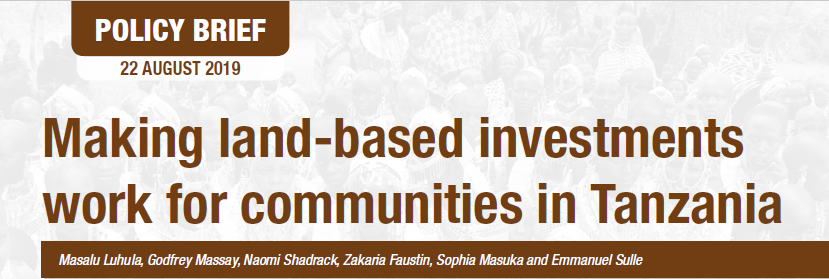The National Engagement Strategy (NES)
The National Engagement Strategy (NES) is a national strategy employed by Members of the International Land Coalition (ILC) that aims at promoting People Centred Land Governance (PCLG), bringing about transformation in land governance at country level. The NES approach is to work towards two main outcomes: a) The setting-up of a multi-stakeholder platform on land governance for policy dialogue and knowledge sharing; and b) A country strategy for engagement on land governance developed and agreed upon by all actors involved.
In Tanzania, the NES was launched in 2016 with three key components which are: (a) Coordination, Communication, Advocacy and Policy Dialogue facilitated by the Tanzania Land Alliance (TALA) (b) the Land-based Investments Component is coordinated by Tanzania Natural Resource Forum (TNRF); and (c) a Rangelands component under Parakuyo Indigenous Community Development Organisation (PAICODEO) and HELP Foundation (contact organisation being PAICODEO) coordination with technical support from the International Livestock Research Institute (ILRI). However, PINGOS Forum took over Rangelands working group coordination from 2018.
The Land Based Investment Working Group (LBIWG) established District and National level Multistakeholders Forums. The established District level dialogue forums include Kilwa, Kilombero, Kilolo and Bagamoyo. Along with Multistakeholders Forums (MSF), the working Group conduct monitoring of large scale Land based investment for Bioshape Company investment in Kilwa District ( This involves four villages of Mavuji, Migeregere, Nainokwe and Liwiti which allocated 34,000 hectares of land to the investor for Jatropha production), Kilombero Sugarcane plantation ( This involves Kilombero Sugar Company that produce sugar can at 10,000 acres of land and out growers who in total grow sugar cane at 23,000 acres’ land) and also the working group monitors Bagamoyo Eco-energy investment in Bagamoyo.
The Land Based Investment Working Group has 18 active members which include, Tanzania Natural Resource Forum (TNRF), Mtandao wa Vikundi vya Wakulima Tanzania (MVIWATA) HakiArdhi, OXFAM, Parakuyo Pastoralist Indigenous Community Development (PAICODEO), Action Aid, Lawyer's Environmental Action Team (LEAT), Care International, Landesa, Agricultural Non State Actors Forum (ANSAF), Ujamaa Community Resource Team (UCRT), Mtandao wa Mazingira Chamwino (MMC), Tanzania Grass Root Oriented Development (TAGRODE), Association for Law and Advocacy for Pastoralists (ALAPA), Naadutaro (Pastoralists' Survival Options), IDC (Bagamoyo), Hadzabe Survival Council of Tanzania (HSCT) and Community Economic Development and Social Transformation (CEDESOTA )
- Community Land Protection Initiative
The Community Land Protection initiative started in February, 2018 to April, 2019. This was a Co-Learning Initiative designed by the International Land Coalition (ILC) to build a supportive cross-regional community of practice to facilitate learning between community land rights advocates. The Initiative aims to be a resource for ILC members engaged in cutting-edge community land protection efforts: as a platform for organizations to teach one another their most successful fieldwork strategies, collaboratively innovate solutions to complex problems, and pool their knowledge and expertise in ways that can then offer lessons to members across ILC’s network. The initiative aimed at building a supportive community of practice to facilitate learning between community land rights advocates, equip ILC and NES member organizations with the practical skills to support communities to document and protect their indigenous and customary lands while strengthening local land governance, natural resource management, and the land rights of women and members of marginalized groups; share learning and best practices both cross-regionally and within countries, to increase the number of organizations successfully supporting communities to proactively protect their lands and resources; and test new tools for enhancing community land tenure at the local level. The initiative was a yearlong process that involved one-week workshop of teaching each other the specific practical, logistical details of their organization’s proven strategies for community land protection, design a community land protection project that includes new strategies learned from other participants over the course of the week and Quarterly video-conferences
Workshop: The Tanzania Natural Resource Forum (TNRF) formed one of the seven organizations from different parts of the region met in Nyeri Kenya at Aberdare Country Club from 4th to 11th of February, 2018. The workshop aimed at sharing experience and learn from each other on different initiatives implemented by the respective organizations. The organizations included the Tanzania Natural Resource Forum (TNF), Community Assistance in Development (COMAID) Jaringan Kerja Pemetaan Partisipatif (JKPP), Instituto del Bien Común (IBC), ECOLEX, Namati and the international Institute for Environment and Development (IIED). Apart from sharing experiences, IIED and Namati also provided technical support during the co-learning.
Design a community land protection project: piloted By-law making process for natural resource management as implemented by Namati. The experience brought into Visioning and Valuation process into the bylaw making process which was unique for the experience of bylaw making in Tanzania. The experience was Due to budget limits, only by-law making was piloted in two villages of Mavuji and Chiwachiwa villages in Kilwa and Kilombero Districts respectively
Quarterly video-conferences. In the course of the year TNRF was able to participate in at least six video co-learning calls and learn strategies used by different organization to ensure protection of community land rights. This includes the peer to peer learning and presentations from experts. Some of the learning insights include, how to support empowered investor-community interactions and The use of model Contracts to ensure responsible investments (experience by the Columbia Center on Sustainable Investment (CCSI)), Land grabbing and community struggle in the process of customary land restitution (experience by the Forest People’s Programme-FPP), Litigation against bad faith large Scale Land Investment (experience of Namati in Siera Leon)

